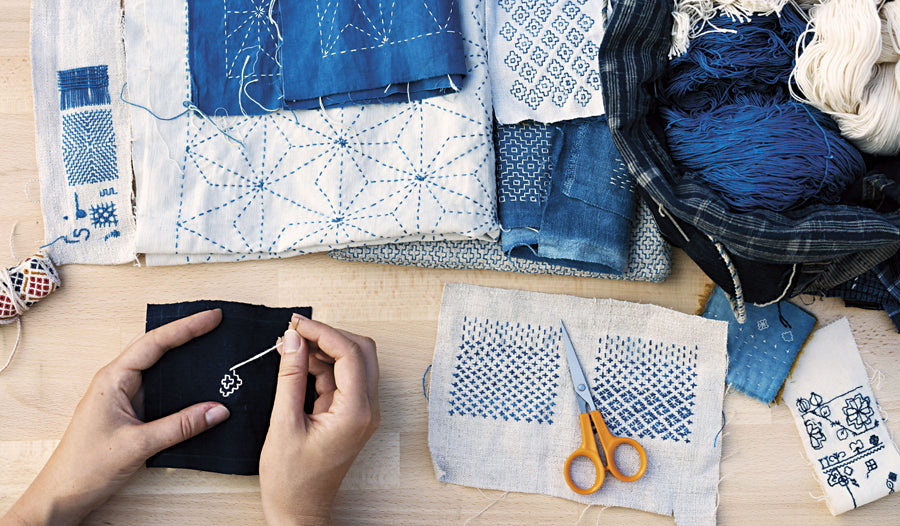
On the Mend: Mending as Metaphor
 Image: Photograph by Hampus Andersson, from Mend & Patch: A Handbook to repairing clothes and textiles by Kerstin Neumüller, published by Pavilion.
Image: Photograph by Hampus Andersson, from Mend & Patch: A Handbook to repairing clothes and textiles by Kerstin Neumüller, published by Pavilion.
The metaphors related to mending and repairing are endless. The work of mending our clothing quickly transfers to the work of healing our relationship to our bodies and our planet. Through textiles we can analyze the history of capitalism, colonialism, economics, export, import, agriculture, labor, religion, art, costume, culture, and nearly everything we’ve touched as humans. We’ve been wearing and repairing our clothing since the beginning of recorded history.
Yet this moment in fashion and life on this planet is unlike any before. This moment is begging us to consider our habits. It’s showing not-so-subtle symptoms of being overworked, overharvested, and underappreciated. We can point fingers in every direction—and some need pointing at the legislators who can affect policy to make colossal shifts—yet we can also point that finger at ourselves. As consumers, we can use our resources (time, money, and skill) to influence industry and politics. We don’t have to look much further than the eruption of organic food options to remember that consumption is a twoway relationship between supply and demand or industry and consumer. Just a few decades back, organic food was not nearly so readily available. Individuals and collectives of individuals forced that shift.

We can look at our individual and collective behaviors and see an opportunity for seismic change. I believe in top-down (policy-led) and bottom-up (citizen-led) social change, and that sustained social shifts take both. All too often our politicians are a few months, or even years, behind activists’ messages and the pulse of community interest. In the United States, we send our messages by voting for politicians that represent our values. Or that’s the hope. But even amid the fiercest pessimism we can see the changes in the environmental movement in the last fifty years and know that more change is possible, probable, and essential.
The seventies paved the way toward contemporary sustainable fashion with secondhand clothing and leather sandals and now we are witnessing a huge shift in mainstream fashion—gigantic fashion brands, mainstream publications, and iconic fashion leaders are proclaiming their dedication to reducing environmental impact. This is reason to celebrate. Yet the rate at which we consume and discard goods still needs to shift. We can buy all the organic cotton T-shirts on the planet and still need to confront what we’ll do with those shirts when they need to be washed, dried, repaired, recycled, or ultimately discarded. We cannot buy our way to a sustainable future.
 Image: Photograph by Hampus Andersson, from Mend & Patch: A Handbook to repairing clothes and textiles by Kerstin Neumüller, published by Pavilion.
Image: Photograph by Hampus Andersson, from Mend & Patch: A Handbook to repairing clothes and textiles by Kerstin Neumüller, published by Pavilion.
We will need to shift consumer habits and start discerning what we bring into our homes—or what our industries produce—from the onset. We will need to claim responsibility for those goods from the moment we purchase or design them until we discard them or use them as recycled materials to make something else. If we do, we’ll hopefully see a proliferation of buy-back, take-back, and recycling programs from fashion brands around the world.
We’re still living in a linear economy trying to create circular systems—like mending our blue jeans instead of tossing them into a landfill while denim companies continue to use raw materials to make new jeans. Amid all of this conversation of circularity, mindful shopping, and sustainable fashion, there’s still an incredible opportunity in repair. Through mending we slow down consumption, extend the life of our garments, and increase resilience and technical skill.
Excerpt from the article On the Mend: Mending as Metaphor written by Katrina Rodabaugh for Selvedge Issue 102 Mend. Read the rest of the article, and the rest of our content exploring mending by subscribing to Selvedge.
Join us on Wednesday 20 October 2021 for Caring For Your Clothes, an online Talk with Orsola de Castro, Hikaru Noguchi and Zenzie Tinker: Book tickets here.
